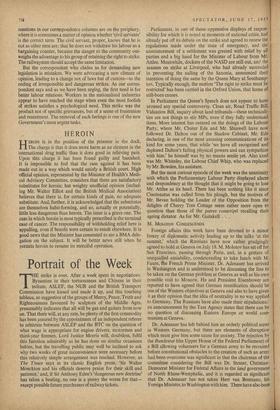Portrait of the Week Parliament, in one of those oppressive
displays of respon- sibility for which it is noted at moments of national crisis, had already put off its debate on the strike and agreed to renew the regulations made under the state of emergency, and the announcement of a settlement was greeted with relief by all parties and a big hand for the Minister of Labour from Mr. Attlee. Meanwhile, dockers of the NASD are still out, and the seamen on strike at Liverpool, who had already succeeded in preventing the sailing of the Saxonia, announced their intention of doing the same by the Queen Mary at Southamp- ton. Typically enough, the motion 'The right to strike must be restricted' has been carried in the Oxford Union, that home of still-born causes.
In Parliament the Queen's Speech does not appear to have aroused any special controversy. Clean air, Road Traffic Bill, Valuation Bill, inquiry about land tribunals—these technicali- ties are not things to stir MPs, even if they fully understand them. More interest has centred on the doings of the Labour Party, where Mr. Chuter Ede and Mr. Shinwell have now followed Dr. Dalton out of the Shadow Cabinet, Mr. Ede declaring, in one of the most amusing communications of its kind for some years, that while 'we have all recognised and deplored Dalton's failing physical powers and can sympathise with him,' he himself was by no means senile yet. Also axed was Mr. Whiteley, the Labour Chief Whip, who was replaced by Mr. Bowden, his assistant.
But the most curious episode of the week was the unanimity with which the Parliamentary Labour Party displayed alarm and despondency at the thought that it might be going to lose Mr. Attlee as its head. There has been nothing like it since Cincinnatus was called from his plough, but the motives of Mr. Bevan holding the Leader of the Opposition from the delights of Cherry Tree Cottage seem rather more open to question than those of the patres conscripti recalling their ageing dictator. As for Mr. Gaitskell . .


































 Previous page
Previous page